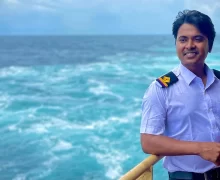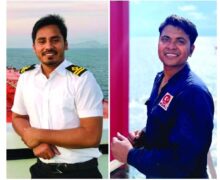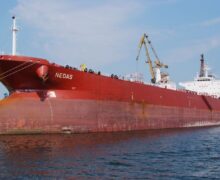
THERE IS NO END TO LEARNING – F R Chowdhury(1N)
The process of learning starts soon after we are born. We keep looking at everything surrounding us. First we recognize the faces of our parents and then we start recognizing the faces of others in close proximity. We keep listening to the surrounding and that is why we first learn to speak in our own mother tongue. Primary school education consists of most essential knowledge without which it is almost impossible to survive in today’s world. Then we go to secondary and high school. It is after H.Sc. that we decide our chosen field of further studies – medicine, engineering, accountancy, law or defence services etc. etc. One more has been added to this long list – and that is a career in the merchant marine.
In the colonial days ocean going ships engaged in international trade used to have European officers. They used to recruit the ratings from their overseas empire. Most of the British ships used to employ ratings from India, Pakistan, Bangladesh and Sri-Lanka though at a later stage Nigerian and Jamaican also joined this group. At the end of the Second World War there were vigorous economic activities in Europe and the European ship-owners had to recruit officers for their ships from educated elite class of people from colonies. West Pakistanis were ahead of us because of their link in high ups. That is why when we joined ships – we came across senior officers from Britain and Germany; and junior officers from West Pakistan.
Establishment of marine academy in Juldia, Chittagong in 1962 slowly started to reduce the gap but even in 1971 when we separated out as Bangladesh most of the senior officers were from Pakistan. By 1970s the design and construction of merchant ships started undergoing very radical changes. Gone were the days of ships with tween decks and wooden hatch-boards where we loaded almost all types of cargoes. Newer technology brought in purpose built ships for specific cargoes and in some cases for specific trade. A master’s certificate from UK was no more the highest sea-going qualification to proudly roam around on any ship. Rather it became another H.Sc. where we have to decide what type of specialization we want to go for because the master mariner certificate alone would not get me a job anywhere.
Marshal plan development and reconstruction required massive movement of oil and gas. Specifically designed oil tankers started carrying hundreds of thousands of tons of oil to and from refineries. These tankers carried crude, refined and other products. Chemical tankers came into operation for carrying various types of chemicals in single chemical tanker. Gas tankers were designed and built for LPG/ LNG. Even storage tankers came into service to ensure steady supply of energy. Operation and maintenance of these tankers require specialized training and initial supervised service. Massive construction required huge shipment of cement and steel. Again ships were designed to meet the requirements. Climate change, localized wars and mass movement of migrants caused sudden famine and short-fall of food grain in different parts of the world. This helped to design bigger and better bulk carriers. These specialized ships required specialized training for operation and maintenance.
In order to reduce damage, theft and pilferage of cargo; and also for quick and easy loading and discharging of the cargo the trading world developed container ships. Now there are even container ships without hatch covers. Operations of container ships require proper training in planning and stowage. In terms of number of ships, container ships perhaps out number all other categories of ships.
Oil and bulk cargo normally are carried on bigger vessels. The operation is cheaper. However, bigger vessels cannot enter all port because of draft limitations. Smaller vessels are used to carry the cargo to its final destination. They still make better sense than carrying all the way on smaller vessels. This gave rise to lighterage/ lightening business. Commercially, in most cases, it is executed under single B/L. In some cases the final part is done by smaller chartered vessels. The main line container operators find it commercially more viable to operate within their global band width and establish link with feeder operators. They feed both ways – scratch each other’s back. They again use thorough/ single B/L. All these arrangements are making commercial operation more challenging and complex.
So far we have discussed variation in training for operation and maintenance on various types of ships. I have talked in terms of deck officers. In some of the cases, the engineers will also require special training. For service on oil, chemical and gas tankers the engineer officers will also require formal training and minimum period of supervised service. Now we shall talk about office jobs that we have in mind for the future. Here again the types of ships that you served will play a key role. By now you can understand that job market is getting saturated and more difficult. Ordinary master and chief engineer stand very little chance in presence of those with further qualification. We will discuss some of the newer types of jobs and relevant training facilities.
Flag states and Classification societies will certainly look for master and chief engineers with varied job experience. In other words those who have experience of having served on more types of ships will have better chances. While recruiting for MCA, I often asked the candidate as to how MCA would be benefitted by recruiting him. We wanted to see what expertise the candidate is bringing with him. Ship-owners look for experience on the types of ships they have. However, companies also look for additional knowledge of law and insurance to assist in claim settlement – litigation and arbitration. Those going for teaching should obtain higher degree such as M.Sc. and Ph.D.
These days many masters and chief engineers undertake on-line courses on statutory survey and certification so that they can convince the prospective employer about their ready availability. There are many organizations that provide such training. Lloyds Maritime Training Institute is one of them. If you are thinking of operating a chartering or agency business, I would strongly recommend you, to join Institute of Chartered Ship-brokers and undertake its courses. ICS also covers marine insurance but it is best learnt through on the job training. The other day I saw some advertisement by Hays Shipping for Marine Technician. I was interested to know as to what type of technician they were looking for and found out that they were looking for insurance brokers.
On this day 30th of September, 2021 when Bangladesh is celebrating the World Maritime Day, I urge up on my community members not to consider obtaining a master’s or chief engineer’s certificate as the culmination of the career. It is again the H.Sc. level to think and study more on your chosen field. Otherwise you stand nowhere. It is a vast international job market and competition is tough. Please spend more time trying to improve your English. It is the language of the sea. It is the number one international language. English is more widely used than any other language in international diplomacy, trade, commerce, banking, insurance and shipping.
London, 26-September-2021 fazlu.chowdhury@btinternet.com







![[নোঙর 2016] আমার সেরা বিদেশ ভ্রমন : নাফিসা মাশহুরা ইরা](http://bdmariners.org/wp-content/uploads/2016/06/Dubai-city-tour-70x70.jpg)




Recent Comments